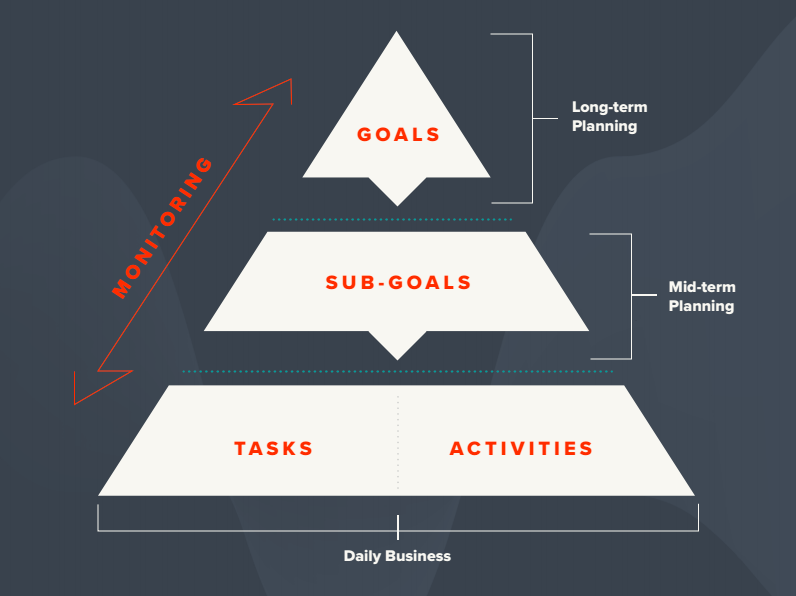
I think we've all been through the Coders Block or through chronic procrastination. I'm going to share with you my best tips and tricks on how to overcome this. Basically, how to do things even when you feel that your body is like an immovable object on the couch.
Chronic procrastination usually comes in when you're trying to learn something new or start a new project and just thinking about getting to it feels like a chore. You kind of feel like you're going to have to start rolling a massive rock up a hill, and your mind knows that it's going to take a lot of hard work to complete the task. Having to do things again is excruciating, but just like the rock you need to push to the top of the hill, once you get to the top of the hill, things start to change and you can start rolling down the hill. That's when the work pays off, that's when you're even starting to build momentum, and that's why I want to help you get that momentum going and to the point where your efforts are beginning to pay off.
So I've put together a list of the five best tips I've found that can help you get things done.
1. Find out your motivating WHY.
This one is somewhat generic, but I have some really great advice here that has completely changed the way I do things.
I really don't like it when people suggest you discover your why, because I feel like this is a really unclear advice that's really easy to tell someone else. But the real thing I always wanted to know is, "How do I figure out why?" so that's what I want to help you with.
Personally, I've recently started writing down as many goals I can think of. And then when you're happy with what you've got, take a look at them and try to figure out if you can create a goal hierarchy.

For example, let's say that you have a goal of getting 10.000 Followores on Instagram.
And you have a second goal of making $1000 a month from a Software you wrote.
This can be turned into a hierarchy, because if we assume that the reason that you want to get more followers on Instagram is because then you're more likely to get more People to buy your program and more likely to reach the $1000 that you want to make.
So this means that making the $1000 is actually the Primary goal and getting more followers on Instagram is actually a sub goal of making $1000. Getting followers is actually the how of how to make $1000.
You do this for all your goals and then once you're done you try to figure out what the top goals for each hierarchy can be categorized as. Let's say that one of the top goals end up being, "make $1000 a month". Is this actually the goal or isn't it actually the goal to become self-employed?
At some point you get to the most basic goal that is steering all the other goals and at that point you basically figured out the coordinates for your destination or in other words your WHY so now you can start the route in the question of how else could I reach my destination.
When I first did this I realized that a lot of my goals were kind of unnecessary.
I actually ended up removing a lot of my goals. it's very easy to set goals that you think will lead you to where you want to go but if you don't first figure out the coordinates of your destination then it's really difficult to find the most efficient route to get there and that's why I think this is one of the first things that everyone should do. First figure out your destination then figure out the routes and your destination can then be used as a reminder of why you should get off the couch and do the things that you really don't feel like today.
2. Set an Alarm.
I'm a dedicated alarm user, and I set alarms when I need to get up and write, program, read, etc.
Actually, one big thing that kept me from doing things is totally ignoring the time. I'm eating and watching YouTube videos at the same time. And then an hour went by unexpectedly.
Setting alarms at least minimizes the risk of doing so, but remember that it is very easy to ignore the alarm. I suggest you challenge yourself to follow your alarms like a slave for a week. Basically, you're reprogramming your brain to the point where you don't think, you're doing it when you hear the alarm.
Alarms are the easiest way to exercise discipline, no snooze and no delay. Just stick to the alarm, because there are two things this practice is going to do:
- It's going to minimize wasted time.
- This will increase your personal responsibility. If I say I'm going to write something at 6 p.m. I can trust myself to do it at 6 p.m. If you make such promises to yourself routinely, you 're going to start building up your own accountability. If I say that I'm going to do something, then I'm going to do everything I can to get that done. This starts to build your self-esteem and momentum, you start to feel like you're the kind of person who gets things done. I admire simplicity and alarms must be one of the easiest ways to build discipline and increase efficiency.
3. Break things down.
Tasks often seem to require a ton of effort, because we're not really sure where to start and break it down can really help you see a route.
Just start writing a to-Do List. It'll be clearer and easier to get started.
If you have a to-do list in front of you, and you feel that it's too much effort to even waste time starting, then most likely you haven't broken the work down enough. Proper planning is really one of the keys to being productive. Plan your to-do list a day or even a week before.
That way, a few days before, you spend the energy to break down each task into comprehensible sub-tasks. And the day you're planning to start, you can start right away.
You don't even have to spend any energy thinking about how to get started. Well, because that's already taken care of.
4. Change your surroundings.
This one may be even simpler, and that's to increase productivity and energy for a specific task.
This can be as simple as changing your environment. If you're always working on a stationary computer in your room, try using a laptop and sitting in the living room. Try going to a coffee shop.
Or maybe you might be able to move your desk to the other side of the room. Even some kind of change can bring great benefits.
Try it, maybe you like it.
5. Pinpoint your Weaknesses.
Figure out when and where you tend to get stuck.
For instance, I love eating lunch while watching some YouTube and usually what will happen is that I'll get stuck.
After I'm done with breakfast I will usually still have a bit left on a video which means that I'll lean back and get comfortable.
Before I know it, my body has turned into a block of concrete on the couch and just getting to the computer that's barely 5 meters away has become a huge task. Let alone actually working on the project I should work on.
So what I tried was to eat in the kitchen instead, without watching anything on YouTube or listening to music. Just in complete silence.
This really made me consistently more productive.
